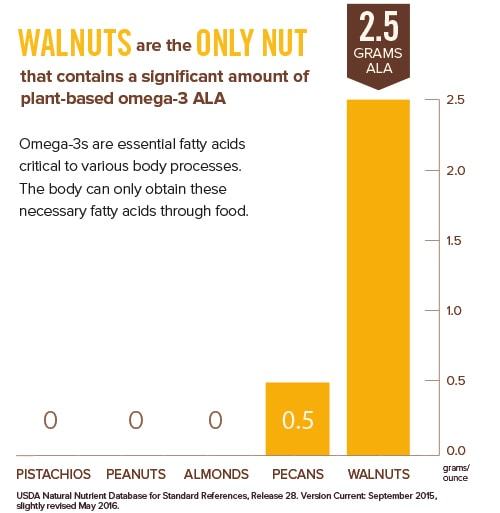Walnuts
Walnuts contain good fats, such as monounsaturated and polyunsaturated fats (PUFAs), they also contain essential fatty acid omega-3. They also contain iron, selenium, calcium, zinc, vitamin E and some B vitamins. Walnuts are also a good source of magnesium (44mg/30g) and phosphorus (98 mg/30g) – both important minerals involved in the body’s processes. 7 whole walnuts or 14 half walnut is one ounce (roughly 30g).

- Cancer-Fighting Properties: Walnuts may help to reduce the risk of prostate cancer and breast cancer. In a study, walnuts reduced prostate cancer growth by 30 to 40 percent, it also cut breast cancer risk in half and slowed tumor growth by 50%.
- Heart health: Research shows that people who eat lots of omega-3 ALA are less likely to have a fatal heart attack and have a nearly 50 percent lower risk of sudden cardiac death.
- Powerful Antioxidants: In human supplementation studies, walnuts have been shown to improve the lipid (fat) profile and reduce inflammation without causing weight gain.
- Brain Health: Walnuts contain a number of brain boosting compounds, including vitamin E, folate, melatonin, omega-3 fats, and antioxidants.Walnuts support brain health.
- Diabetes: The healthy fats in walnuts can help to reduce fasting insulin levels.
Omega-3 content
Walnuts are the only tree nut that is an excellent source of alpha-linolenic acid (ALA), the plant-based omega-3 essential fatty acid. As one of the best plant food sources of omega-3s, a 30g serving of walnuts provides 2.5 grams of ALA.
There are three main omega-3 fatty acids:
- alpha-linolenic acid (ALA)
- eicosapentaenoic acid (EPA)
- docosahexaenoic acid (DHA)
Omega-3s cannot be made in the body, so they must come from food. EPA and DHA are found in fatty fish, including salmon (sock eye is the best), mackerel, and trout.

Walnuts and sleep
Walnuts contain tryptophan and melatonin (black walnuts contain more tryptophan). With the highest dose of the amino acid per serving, pumpkin seeds provide 110 milligrams per 30g serving, walnuts contain over 50mg of L-tryptophan per 30g serving. Tryptophan achieves its effects by way of serotonin, one of the key brain chemicals involved in regulating mood. Among other functions, serotonin promotes feelings of calm, relaxation, and sleepiness. Walnuts will decrease stress and cortisol levels.
Walnuts and testosterone
Walnuts get a bad press among the bro-science testosterone community. If you look at many websites, walnuts get a red light because they 'allegedly' raise Sex Hormone Binding Globulin or SHBG levels in men (thus reducing free testosterone). However if you read the specific studies, you will find that a 75g per day intake of walnuts (50 walnut halves) over a long period made no difference to SHBG levels.
Walnuts contain boron (1.63mg/100g, there is no RDA for boron but this represents 50-75% of a healthy amount). Boron is a known testosterone booster. Boron is also associated with the metabolism of calcium and magnesium, so is essential for healthy bones and joints.
A 2012 study found that walnuts improve semen quality in men consuming a Western-Style Diet. walnuts are particularly rich in ALA, omega-6 FAs, antioxidants, and micronutrients including folic acid. The tryptophan in walnuts will decrease cortisol and therefore increase testosterone.
Source: mercola.com, walnuts.org, draxe.com
